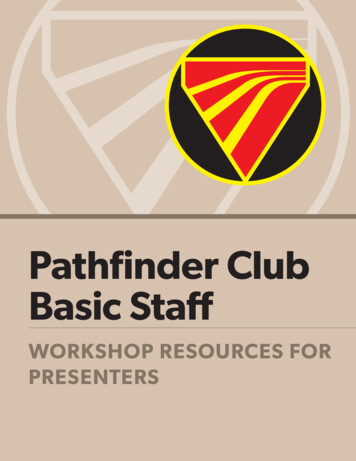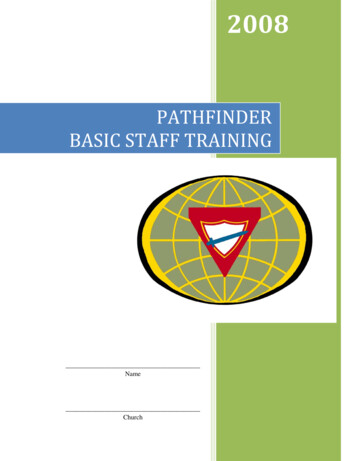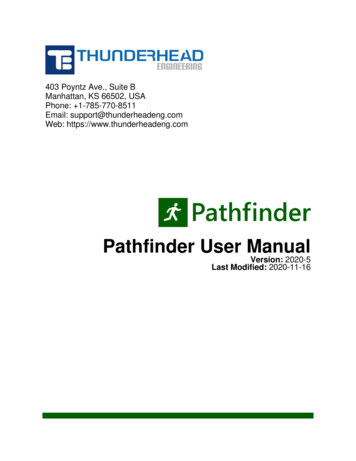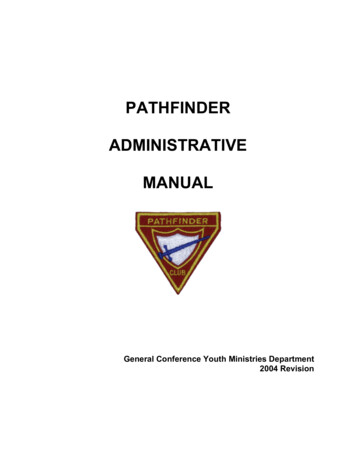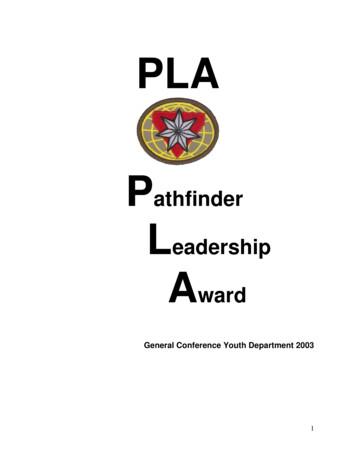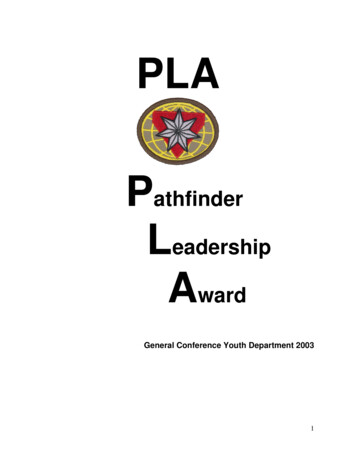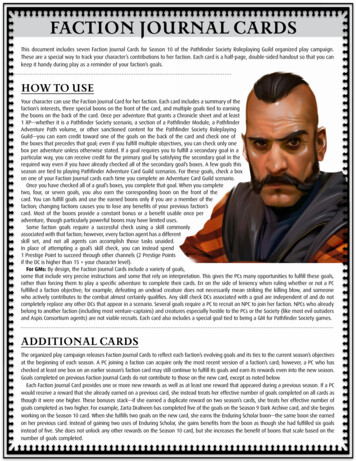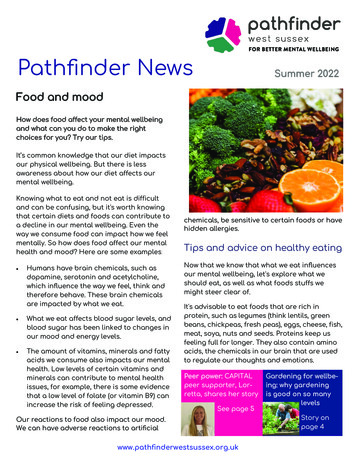
Transcription
Pathfinder NewsSummer 2022Food and moodHow does food affect your mental wellbeingand what can you do to make the rightchoices for you? Try our tips.It’s common knowledge that our diet impactsour physical wellbeing. But there is lessawareness about how our diet affects ourmental wellbeing.Knowing what to eat and not eat is difficultand can be confusing, but it's worth knowingthat certain diets and foods can contribute toa decline in our mental wellbeing. Even theway we consume food can impact how we feelmentally. So how does food affect our mentalhealth and mood? Here are some examples: Humans have brain chemicals, such asdopamine, serotonin and acetylcholine,which influence the way we feel, think andtherefore behave. These brain chemicalsare impacted by what we eat. What we eat affects blood sugar levels, andblood sugar has been linked to changes inour mood and energy levels. The amount of vitamins, minerals and fattyacids we consume also impacts our mentalhealth. Low levels of certain vitamins andminerals can contribute to mental healthissues, for example, there is some evidencethat a low level of folate (or vitamin B9) canincrease the risk of feeling depressed.chemicals, be sensitive to certain foods or havehidden allergies.Tips and advice on healthy eatingNow that we know that what we eat influencesour mental wellbeing, let's explore what weshould eat, as well as what foods stuffs wemight steer clear of.It's advisable to eat foods that are rich inprotein, such as legumes (think lentils, greenbeans, chickpeas, fresh peas), eggs, cheese, fish,meat, soya, nuts and seeds. Proteins keep usfeeling full for longer. They also contain aminoacids, the chemicals in our brain that are usedto regulate our thoughts and emotions.Peer power: CAPITALpeer supporter, Lorretta, shares her storySee page 5Our reactions to food also impact our mood.We can have adverse reactions to artificialwww.pathfinderwestsussex.org.ukGardening for wellbeing: why gardeningis good on so manylevelsStory onpage 4
Eat foods which contain the right fats. Avoidsaturated fats and try to eat unsaturatedfats, monounsaturated fats andpolyunsaturated fats. Our brain requiresfatty acids, such as Omega-3, to functioncorrectly, so it is important to eat foodswhich contains them. Foods that containhealthy fatty acids include poultry, fish,vegetable oils, nuts and seeds.Include slow energy release foods in your diet, asthey keep us fuelled for longer, helping us feelmore energetic. Foods that release energy slowlyinclude potatoes, oats, wholegrain foods (rice,pasta, quinoa) and pulses (peas, lentils).Eating regularly is crucial to keep agood and level balance of bloodsugar. When our blood sugar leveldrops, we often feel tired, irritable anddown. If you are worried that eatingregularly might lead to weight gain, trysmaller meals and portions, makinghealthy choices. But don’t skip meals.Skipping meals can leave us in a badmood and feeling drained of energy.Drink lots of waterWhen we are dehydrated, ourconcentration suffers and our mood canbe affected. Drink six to eight glasses ofwater a day. Drinks like squash, coffee andEat five portions of fruit or vegetables a day. As antea count towards this. But drinks otherimportant source of vitamins and minerals, theythan water often containhave been shown to have a positive“Eat diversely and substances, like sugar andimpact on our mental wellbeing.caffeine, that also affect mood.Think about quantity. Don’t eat too much,as it can leave us feeling bloated and sick,which can in turn have an adverse impacton our mood. Conversely, avoid eating toolittle as it can make us physically andmentally tired and add to irritability andlow mood.have an occasionaltreat. Eating toostrictly will lead toyou getting fed upwith your diet”Avoid unhealthy foodsAvoid foods and drinks which can cause yourblood sugar levels to rise and drop quickly, suchas sweets, sugary drinks and alcohol.Ultra-processed food, such as breakfastcereals, crisps, pre-packaged meals andreconstituted meat, tend to be higher incalories, containing more salt, fat andadded sugar. Therefore, they should beavoided or only eaten occasionally.Food and drink that are high in calories and low innutritional value should also be avoided, such assweets, chocolate and crisps. Whilst nice as anoccasional treat, regular consumption can lead toweight gain and sluggishness.Keep a food diaryA food diary is a great way tokeep track of the food you areconsuming. You can countcalories, keep track of mealtimes,meal content and record howdifferent foods make you feel.There are lots of apps for this.Be kind to yourselfDon’t be too hard on yourself. Thewidespread availability of processed andsugary foods and budget can make healthyeating hard. And remember the importanceof enjoying your food. Eat diversely and havean occasional treat. Eating too strictly willlead to you getting fed up with your diet.ExerciseExercise has been found to have a positiveimpact on our mental health and if youexercise and make healthy food choices, thetwo combined can really improve your mood.2
Feeling the pinchMichelle reflects on the stigma she feelsabout living on benefits – and the additionalpressure and stress created by the risingcost of living.Michelle has been sufferingwith her mental health sinceshe was 16. She has bouts ofdepression on and off – and iscurrently on benefits, due tolong-term mental and physicalhealth issues.“My husband left in May 2008,just two years after my firsthospitalisation due to mentalhealth problems, and I couldn’tafford to take him to court. Sowe sold our house and I movedinto rented accommodation inCowfold. I worked part-time as ateaching assistant and business manager inschools, so that I could take my daughtersto school. I muddled along and just aboutmanaged financially.“But in 2015, I had to give up my job due tomy mental health and I had to apply forbenefits for the first time. They took threemonths to come through and I had to relyon food banks during that time. I had toadjust to this new ‘lifestyle’, which meantfocusing on making ends meet for essentialswith no treats, for example, going to thecinema. Life has continued like this and Ihaven’t worked since.“It’s a terrible thing to have to give up yourjob and live on benefits. I’ve worked since Iwas 16 (I’m now 54) and I was good at my job.When I had to give up work, it felt like I hadthe carpet whipped out from beneath me.“You feel useless, you don’t feel like a humanbeing. You experience lots of negativity,because there is so much stigma attachedto being on benefits. It has a big impacton my mental health – not feeling like aproductive member of society, feeling likethe dregs – and that is difficult.“I’m really worried about rising prices rightnow. My big concern iselectricity. I’ve had a lettersaying my electricity will goup by 648 a year, which is anenormous amount for me. I’vehad my heating turned offsince the end of February andI’m worried how things will workout come the winter."Food is another big concern.I have a set amount I can spendeach week and in the last fewmonths, I’ve spent more thanI have allocated, because foodis so expensive. I’ve cut backas far as I can. I try to eathealthily, particularly because Istruggle with physical issues, but I often findmyself living off the cheapest and leasthealthy things. Frozen vegetables are muchcheaper than fresh and so a lot of my foodis frozen. In a month, I’m finding I only haveenough money for food for three out of thefour weeks. So I’ll have to start using foodbanks again for one week out of four.“I have had an increase in benefits to helpwith the rising cost of living. It is 35, butthat won’t see me through one week inpetrol, as I live in a semi-rural area.“I usually feel better coming up to summer.But this year, I feel worse because of myworry about coping financially. The stressof this is huge. I feel like a minority, but alsofeel like I shouldn’t complain.”Michelle volunteers for Mind in Brighton &Hove as a peer supporter. Seeorganisations and resources for help withthe cost of living: bit.ly/costofliving-help3
Stonepillow, Richmond Fellowship and West Sussex Mindstaff (pictured) had a ball at the first ever ChichesterPride in May and promoted their new LGBTQI AlliesWest Sussex Mind’s Tracy Ashcroft with thefabulous Cherry Liquor at Chichester Pride.Gardening helps alleviatestress and boosts wellbeingextrapolated based on nationallyrepresentative statistics and the UKpopulation.Over seven million people have taken upgardening since the pandemic and are findingsignificant benefits for their mental health.The survey found that since the pandemic, overseven million people say that their mental healthhas benefitted from taking up gardening andanother seven million say that their mentalhealth has been boosted by connecting withpeople outdoors, for example, speaking to theirneighbours over the fence. But it’s not just thosewith gardens who are seeing the benefits. Fortythree per cent of people said that looking afterhouse plants or growing plants or food inwindow boxes was also good for their wellbeing.Two-thirds of UK adults (63 per cent) say thatspending time gardening or in nature helpstheir mental health, according to a newsurvey from national Mind. Respondentswere asked how they felt gardeningbenefitted their wellbeing and the top threeresponses were:63 per cent said it made them feel calmeror less stressed 43 per cent said they enjoyedtaking in the colours, sounds,sights and smells 40 per cent said thatexercising outside boostedtheir wellbeing. The survey was conducted byCensuswide among a nationallyrepresentative sample of 1,000UK adults. The data was then“This research provides evidence thatgardening, in particular, playsa key role in bringing togethera host of things that are goodfor our mental health,” saidMind CEO, Paul Farmer.“Taking in the sights andcolours of the outdoors,nurturing and growing plantsand finding space to connectwith others can make a worldof difference to how we feel.”4
The power of peer supportWe spoke to Lorretta, a peer supporterat CAPITAL Project Trust, about why peersupport is such a powerful thing and whatit brings to her and those she supports.How would you describe your role?As CAPITAL peer supporters, we use ourtraining, lived experience and our ownmental health journey to support peoplewho have been hospitalised because of theirmental health. We provide support, empathyand encouragement to help people moveforward on their journey.As a peer, I’m on the same level as thepeople I support on the ward. I’mindependent of NHS staff and, because ofmy own experience, I know where they havebeen and the kinds of things they may bestruggling with, and so I can support them inthe way that they need.Talking to a peer is very different to talking toa clinical professional. People tend to open upmore to us, because we have a personalconnection with their predicament. Over time,you build a rapport with people. They startto open up and you build trust.I typically support someone from when theycome into hospital to when they are ready toleave and go back out into the community.Some people may stay in hospital for a fewdays; others for a whole year. I talk topeople. We do colouring, artwork andknitting. I brush their hair. I paint their nailsif they ask for that. And as we do somethingtogether, we talk and build trust.I work in two wards at Langley Green Hospital inCrawley twice a week and have been supportingpeople for the last year and nine months.What brought you to CAPITAL Project Trustand to becoming a peer?I’ve been grappling with my mental healthfrom a young age. I left school with noqualifications and I was bullied at school. Istruggled with an eating disorder, self-imageand depression, and I had addiction issues.After getting married and living and workingin Bognor for a few years, I moved back to myhome town of Crawley and that’s when thingsstarted spiralling for me. I began self-harmingand was hospitalised, because I wasconsidered a risk to myself, and I spent thenext four years in different hospitals. I had agood few years after my second son wasborn, but then ended up in Langley GreenHospital when I started spiralling again.While I was there, I met a peer fromCAPITAL. She explained what CAPITAL was,and she asked me if I wanted to become amember. I did CAPITAL’s members trainingand joined this amazing community. I feltlike I had a family for the first time – afamily that didn’t judge or comment onwhat I did and really believed in me.There was an opportunity to train as apeer supporter. So I did the 12-week course,combined with 90 hours of home learning.It’s a Level 4 course and the equivalent of5
completing the first year at University. It’s thefirst thing I have ever passed in my whole lifeand I felt incredibly proud. I had to complete apractical assessment at the hospital, before Iwas able to practise on the ward, but I passedthat and began my work as a peer supporter.In terms of my own health and wellbeing, being apeer supporter gives me everything. It gives meself-belief, purpose and a reason to put a smileon my face every day. I know that if I can walkinto the hospital and help just one person, then Ihave done a good job. To be able to see theprogress people make gives me the self-beliefand empowerment I need to know that I canmove forward with my own mental health. Beinga peer means everything to me.Why is peer support important in mental health?The understanding and empathy that peersupporters have with a person who is strugglingwith their mental health can’t be underestimated. Professionals have in-deptheducation and training to help them care forpeople with mental health needs and prescribeand administer medication if appropriate. Butpeers can give clients answers that a clinicalmember of staff wouldn't be able to give.Clinicans develop through their educationand training, but not necessarily throughlived experience of mental health like peersdo. CAPITAL’s stands for “Clients andProfessionals in Training and Learning”. Wehave a culture of continuous learning forpeers with lots of opportunities for trainingand self-development. And we work withmedical professionals to help themunderstand about mental health from amore personal perspective – and tohopefully increase their understanding andempathy for people who are struggling.Peer support is also really important, becauseit gives people hope for their own recovery.They see us helping others through our workand that gives them hope for the future. Wehelp them to understand that a journey isnever-ending and that you move forward onestep at a time. I am still on my journey, butnow I believe that I can have a happy life. Ifyou have a mental health condition, you canstill have the life you want.See www.capitalproject.org/peer-supportworkers for more information aboutCAPITAL’s peer support work.If you haven’t already, pleasecheck out our Pathfinder video.It really showcases how ourjoined up working supportspeople’s mental health andcan improve people’s lives acrossWest Sussex. See YouTube link atbit.ly/pathfinder-video.Hear from people who’ve used thePathfinder service and staff members about our long-term mentalhealth support across the NHSand the community.6
How United Responsesupports peopleJohn Barnard, senior service manager atUnited Response, gives an overview of thedifferent aspects of the charity’s mentalhealth support.United Response has been offering mentalhealth support since 1997. Five years ago, webecame part of Pathfinder, an alliance of tenorganisations of third sector mental healthproviders and secondary care services inWest Sussex, which ensures that people withmental health needs can find the rightsupport.run self-care sessions, which provide tools andtechniques to help people manage the emotionsthat are having a negative impact on their lives.We receive on average 70 referrals for supporteach quarter and we actively supportapproximately 150 people at any one time.We offer group support too - from walking,emotional management and creative art,to a twice monthly drop-ins at the localcommunity church café, where we informpeople about the support available in thelocal area. Our support is short-term and isusually completed in around 12 sessions.Supported housingWe support 15 people in United Responsemanaged properties .This support is for peoplewith severe and enduring mental health issues,who all generally have poor housing history.The support we provide gives people the skillsto manage their tenancies and to eventuallymove on into their own home.Left to right: United Response’s John Barnard with mental healthsupport workers, Steve Cook and Jan Pranskus.HOUSE 48 is our mental health resource centrein Bognor Regis. It offers a single point of contactto support people with their mental health or tosignpost them quickly to where they can gethelp. We are also able to refer people toPathfinder clinicians for more complex cases.At United Response, we offer support withstress, anxiety, sleep patterns, self-harm,suicidal thoughts, general wellbeing, panicattacks and low mood/depression. We alsoWe also offer floating housing support forpeople who could at risk of losing their home,and we support people to maintain tenancies orfind more suitable accommodation. People whocome into our housing service could be with usfrom six months to five years, depending on thehousing stock available and their place on thehousing register. This service is provided by twofull-time and one part-time support worker andthese are challenging roles that require goodmediation skills.Community support workersFinally we have seven community supportworkers across West Sussex, who are placedin the NHS trust assessment and treatmentservice, and support patients with complexmental health issues. Their work ranges fromsupporting people to apply for benefits tohelping them engage in social activities andmanage their mental wellbeing.7
Crisis numbersSamaritans – 24/7, call 116123Calm – open daily 5pm to midnight, call0800 585 858Sussex Mental Healthline – 24/7, call 08000309 500Papyrus – open daily 9am to midnight, call 0800 068 4141What is Pathfinder West Sussex?Pathfinder West Sussex is an alliance of organisations working togetherto enable people with mental health support needs, and their carers, toimprove their mental health and wellbeing.We provide a pathway of mental health recovery support so people canmove freely between services to get well and stay well.Services are provided in ten areas: Adur, Bognor, Chanctonbury, Chichester,Crawley, Horsham, Littlehampton, Midhurst, Mid Sussex and Worthing.The four lead providers of Pathfinder services are West Sussex Mind,United Response, Sussex Oakleaf and Richmond Fellowship. The otherorganisations that make up the alliance with them are CAPITAL ProjectTrust, Mind in Brighton and Hove, Rethink, Stonepillow, Southdown andNHS Sussex Partnership Foundation Trust (SPFT).See www.pathfinderwestsussex.org.uk8
check out our Pathfinder video. It really showcases how our joined up working supports people's mental health and can improve people's lives across West Sussex. See YouTube link at bit.ly/pathfinder-video. Hear from people who've used the Pathfinder service and staff mem-bers about our long-term mental health support across the NHS
